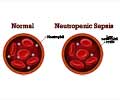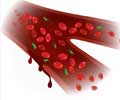In sepsis, when c-Jun N-terminal kinase (JNK) molecule becomes active it increases the production of a BNP protein, the more BNP that is produced the greater the deterioration of cardiovascular function, said new study.

‘In light of the ongoing COVID-19 global pandemic, the association of COVID mortality with viral sepsis, and elevated BNP plasma levels in critical COVID-19 patients, the topic of BNP inhibition is very timely.’





"Low blood pressure is characteristic of the most severe form of sepsis, known as septic shock, in which fluid loss and decreased oxygen and nutrient delivery to tissues severely damages organ function," explained Konstantinos Drosatos, PhD, Assistant Professor of Pharmacology and Assistant Professor in the Center for Translational Medicine, the Center for Metabolic Disease Research, and the Alzheimer's Center at LKSOM and senior investigator on the new study. In previous work, Dr. Drosatos's team found out why heart cells decrease their energy output in sepsis. They also knew from earlier studies that blocking JNK activation could correct cardiovascular dysfunction and lower BNP levels in an animal model of sepsis. The new study expands on this work and demonstrates how treatments aimed at improving cardiovascular function facilitate communication between the heart and blood vessels, which circulate blood throughout the body.
The researchers carried out their investigation of JNK and BNP activation in heart cells and in a mouse model of sepsis. Their experiments revealed a direct relationship between the two molecules, in which a c-Jun activating protein attaches to the gene that encodes BNP. When this happens, the gene is switched on, resulting in the production of BNP. In sepsis, the BNP-encoding gene is always "on," explaining why BNP protein is secreted in excess by the heart.
In separate experiments, the researchers blocked either JNK activation, using a chemical inhibitor, or BNP activity, using an antibody against the protein that was developed in Dr. Drosatos's laboratory. Both approaches restored blood pressure in septic mice, though JNK inhibition yielded the most robust benefits. Inhibition of either molecule also led to improvements in survival from sepsis.
"At a clinical level, JNK or BNP inhibition could stabilize blood pressure and give other medications, such as antibiotics, time to work," Dr. Drosatos explained. "This strategy could be used alongside current supportive strategies, which attempt to slow or prevent fluid loss to stabilize blood pressure."
Advertisement
Another important next step is to explore whether the new monoclonal antibody against BNP can be used as an intervention to treat low blood pressure in sepsis patients.
Advertisement















